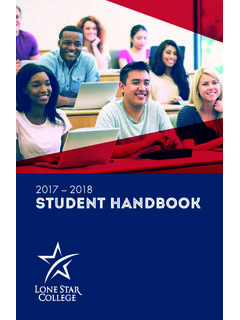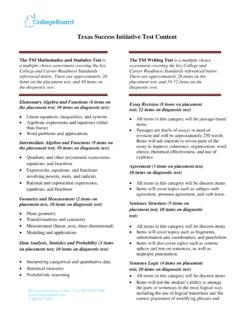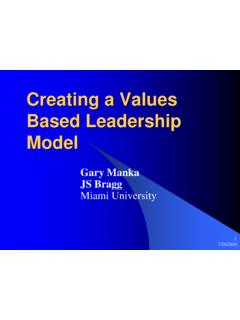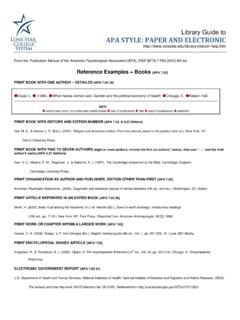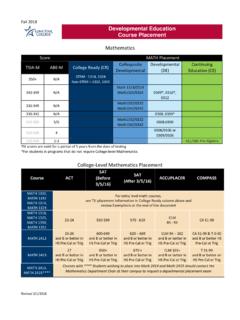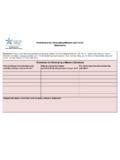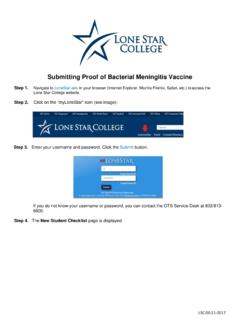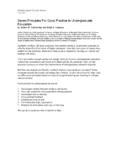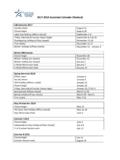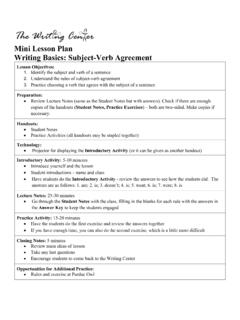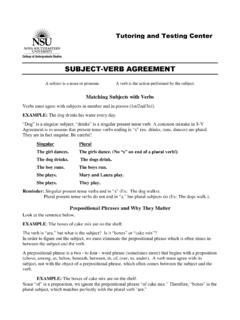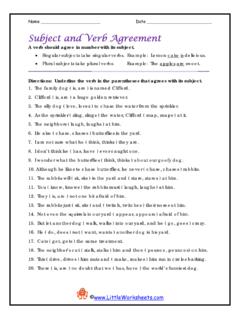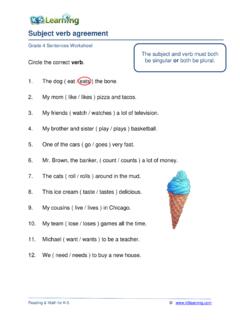Transcription of Agreement of Subject and Verb - Lone Star College
1 Agreement of Subject and verb Verbs can change form in tense, person, and number. The Subject and verb of every clause (independent or dependent), however, must agree in person and number. Once you identify the Subject and the verb , you can then determine such Agreement of the Subject and the verb . There are three persons: First person- the speaker Second person-the person spoken to Third person- the person spoken about There are two numbers: Singular- denoting one person or thing Plural- denoting more than one person or thing Nouns ending in s are usually plural. Verbs ending in s are singular. Singular subjects should be paired with singular verbs and plural subjects should be paired with plural verbs. she walks the book is they want Bill, John, and Jane go 1.
2 Compound Subjects Compound subjects joined by and normally require a plural verb : Hard work and persistence are required in all rewarding accomplishments. Where are the pens and paper? Subjects which include at least two nouns or pronouns connected by and should be paired with plural verbs. the manager and the employees are the cats and the dog run the man and the woman are 2. Subjects Joined by Or or Nor When two or more Subject are joined by or or nor, the verb should agree with the Subject part closest to the verb . This also applies to either/or and neither/nor. the professor or her students write the students or their professor writes the boy or the girl walks 3. Intervening Expressions Modifying phrases or clauses that come between the Subject and the verb do not change the number of the verb .
3 The number of the verb is determined entirely by the number of the Subject : The assignment, which they submitted to their professor, was incomplete. [Assignment is the Subject of the verb was]. The new computer classroom, with its many work stations and its sophisticated technology, fills [not fill] a long-felt need. [Computer classroom is the Subject of the verb fills; the phrase with its many work has nothing to do with the verb .] 4. verb Preceding the Subject It is possible for a verb to come before a Subject in a sentence. The rules of Agreement between the Subject and the verb remain the same despite the change in order. There is in many cities a desire to reduce traffic and pollution. [Desire is the Subject of the verb is.] There are a stapler, two pens, four books, and a writing tablet on the desk.
4 [Stapler, pens, books and writing tablet are the subjects of the verb are.] Where are Joan and her daughters going? [Joan and her daughters are subjects of the verb are going.] 5. Indefinite Pronouns The indefinite pronouns or adjectives either, neither, and each, as well as compounds such as everybody, anybody, everyone, and anyone are always singular. None may be singular or plural. The plural usage is more common. Each of the cars has its insurance proof in the glove compartment. Everyone at the meeting was upset over the policies announced. Every employee, supervisor, and executive reveals the operation of a model company. Is either of you ready for lunch? None of the employees have brought their children to the company dinner. None of the students is interested in the research project.
5 None--no, not one--is planning to attend the retreat. 6. Subjects Plural in Form Singular verbs are usually used with nouns that are plural in form but singular in meaning. The following nouns are usually singular in meaning: news, economics, ethics, physics, mathematics, gallows, mumps, measles, shambles, whereabouts. a peanut butter and jelly sandwich physics is a difficult statistics politics athletics Nouns such as gymnastics, tactics, trousers, scissors, athletics, tidings, acoustics, riches, and barracks are usually treated as plural. His tactics are sneaky. The scissors are on the table. The trousers are hanging in the closet. Plural nouns denoting a mass, a quantity, or a number require a singular verb when the Subject is regarded as a unit.
6 Five dollars is too much for her to pay. Fifty bushels was all the bin would hold. Though usage is mixed, phrases involving addition, multiplication, subtraction, and division of numbers usually take the singular form. Two plus two is four. Two times three is six. Twelve divided by six is two. In expressions like part of the apple, some of the pie, all of the money, the number of part, some, and all is determined by the number of the noun in the prepositional phrase. Some of the pie has been eaten. Some of the pies have been eaten. 7. The Subject of some form of To Be When one noun precedes and another follows some form of the verb to be, the first noun is the Subject , and the verb agrees with it and not with the complement even if the complement is different in number.
7 The only food remaining is mashed potatoes. Mashed potatoes are the only food remaining. [In the first sentence, food is the Subject ; in the second, mashed potatoes.] 8. Relative Pronoun as Subject When a relative pronoun (who, which, or that) is used as the Subject of a clause, the number and person of the verb are determined by the antecedent of the pronoun, the word to which the pronoun refers. This is the professor who is to be hired. [The antecedent of who is the singular noun professor; therefore, who is singular.] These are the employees who are to be working tomorrow. [The antecedent of who is the plural noun employees.] Should I, who am not a student at the school, be allowed to take the class? [Who refers to I; I is first person, singular number.]
8 ] She is one of those tough professors who are always expecting the best from students. [The antecedent of who is professors.] If sentences such as the last one give you trouble, try beginning the sentence with the "of" phrase, and you will readily see that the antecedent of who is persons and not one. Of those tough professors who are always expecting the best from students, she is one. 9. Collective Nouns Some nouns are singular in form but plural in meaning. They are called collective nouns and include such words as team, class, committee, crowd, and crew. These nouns may take either a singular or plural verb ; if you are thinking of the group as a unit, use a singular verb ; if you are thinking of the individual members of the group, use a plural verb .
9 When referring to a group as a single unit, a singular verb is used. The public The family The class is When referring to a group's members as individuals, a plural verb is used. The committee fight among themselves. The student body are talking with each other. The class are writing. 10. Nouns with Foreign Plurals Some nouns retain the plural forms peculiar to the languages from which they have been borrowed: alumni, media, crisis. Still other nouns occur with either their original plural forms or plural forms typical of English: aquaria or aquariums, criteria or criterions. If you are in doubt as to the correct or preferred plural form of a noun, consult a good dictionary. Note: Be careful not to use a plural form when you refer to a singular idea.
10 For instance: He is an alumnus [not alumni] of this school. Subject verb Agreement Practice Mark the appropriate verb choice for each of the following sentences. 1. The noisy students (have, has) to leave after two warnings. 2. She is the only one of the students who (have, has) failed the test. 3. The crying baby (irritate, irritates) them. 4. The longest of the presentations (is, are) the next group. 5. The students and their teacher (is, are) traveling to the competition. 6. Either one of the choices (is, are) going to disrupt the schedule. 7. This is the stereo system that (have, has) been purchased most often in our store. 8. Nobody (dare, dares) to challenge the teacher when she is wrong. 9. The players or their coach (is, are) holding a press conference.
